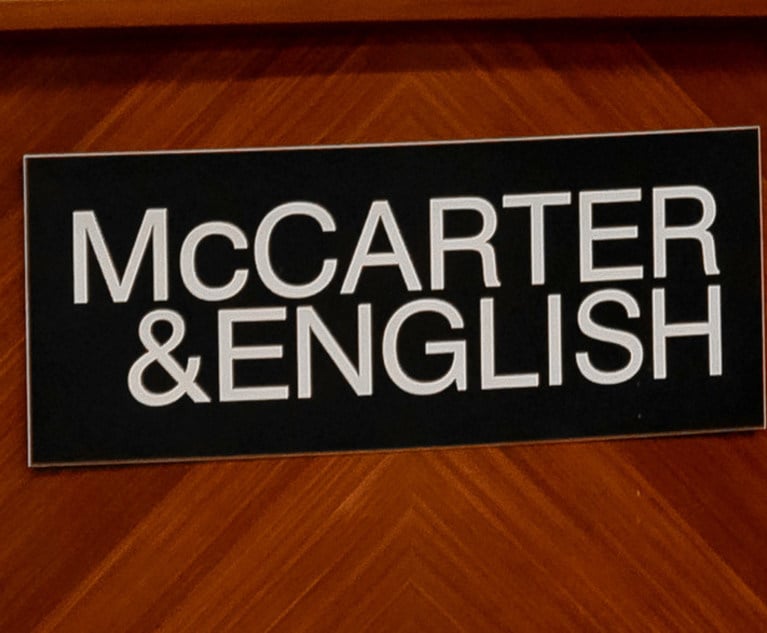What One Law Firm Leader Learned About Diversity From His Clients
Barnes & Thornburg's managing partner, Robert Grand, sought out his client's feelings on law firm diversity. Here is what they said.
June 16, 2017 at 03:39 PM
5 minute read
A meaningful discussion of diversity and inclusion in the legal profession needs to go beyond the empty buzzwords. We recently had an opportunity to talk to a handful of our law firm's clients about what diversity and inclusion really means—to them in their own company's culture and to them as buyers of legal services.
Law firms pay a lot of lip service to diversity and inclusion, yet legal services remain among the least diverse white-collar professions. But changes are finally coming, fast. Corporations such as HP have announced it may start docking fees for outside counsel who don't meet their standards for diversity and inclusion. Last fall, 24 Fortune 1000 general counsels pledged widespread support for ABA Resolution 113, urging law firms to be more diverse.
If GCs are going to these lengths, it clearly means that many in our profession simply aren't embracing—or even aware of—the ways in which diversity and inclusion contribute tangible value, both professionally and personally, to our client relationships and legal work.
Diversity Doesn't Necessarily Beget Inclusion
Our clients tell us that at their companies, while diversity is still crucial, inclusion is what makes it all work.
This content has been archived. It is available through our partners, LexisNexis® and Bloomberg Law.
To view this content, please continue to their sites.
Not a Lexis Subscriber?
Subscribe Now
Not a Bloomberg Law Subscriber?
Subscribe Now
NOT FOR REPRINT
© 2025 ALM Global, LLC, All Rights Reserved. Request academic re-use from www.copyright.com. All other uses, submit a request to [email protected]. For more information visit Asset & Logo Licensing.
You Might Like
View All
How a Paul Weiss Associate’s Career Took Off With Help From a Social Mobility Alliance
6 minute read

Former McCarter & English Associate Fired Over 'Gangsta Rap' LinkedIn Post Sues Over Discrimination, Retaliation
6 minute read
T14 Sees Black, Hispanic Law Student Representation Decline Following End of Affirmative Action
Trending Stories
- 1New York-Based Skadden Team Joins White & Case Group in Mexico City for Citigroup Demerger
- 2No Two Wildfires Alike: Lawyers Take Different Legal Strategies in California
- 3Poop-Themed Dog Toy OK as Parody, but Still Tarnished Jack Daniel’s Brand, Court Says
- 4Meet the New President of NY's Association of Trial Court Jurists
- 5Lawyers' Phones Are Ringing: What Should Employers Do If ICE Raids Their Business?
Who Got The Work
J. Brugh Lower of Gibbons has entered an appearance for industrial equipment supplier Devco Corporation in a pending trademark infringement lawsuit. The suit, accusing the defendant of selling knock-off Graco products, was filed Dec. 18 in New Jersey District Court by Rivkin Radler on behalf of Graco Inc. and Graco Minnesota. The case, assigned to U.S. District Judge Zahid N. Quraishi, is 3:24-cv-11294, Graco Inc. et al v. Devco Corporation.
Who Got The Work
Rebecca Maller-Stein and Kent A. Yalowitz of Arnold & Porter Kaye Scholer have entered their appearances for Hanaco Venture Capital and its executives, Lior Prosor and David Frankel, in a pending securities lawsuit. The action, filed on Dec. 24 in New York Southern District Court by Zell, Aron & Co. on behalf of Goldeneye Advisors, accuses the defendants of negligently and fraudulently managing the plaintiff's $1 million investment. The case, assigned to U.S. District Judge Vernon S. Broderick, is 1:24-cv-09918, Goldeneye Advisors, LLC v. Hanaco Venture Capital, Ltd. et al.
Who Got The Work
Attorneys from A&O Shearman has stepped in as defense counsel for Toronto-Dominion Bank and other defendants in a pending securities class action. The suit, filed Dec. 11 in New York Southern District Court by Bleichmar Fonti & Auld, accuses the defendants of concealing the bank's 'pervasive' deficiencies in regards to its compliance with the Bank Secrecy Act and the quality of its anti-money laundering controls. The case, assigned to U.S. District Judge Arun Subramanian, is 1:24-cv-09445, Gonzalez v. The Toronto-Dominion Bank et al.
Who Got The Work
Crown Castle International, a Pennsylvania company providing shared communications infrastructure, has turned to Luke D. Wolf of Gordon Rees Scully Mansukhani to fend off a pending breach-of-contract lawsuit. The court action, filed Nov. 25 in Michigan Eastern District Court by Hooper Hathaway PC on behalf of The Town Residences LLC, accuses Crown Castle of failing to transfer approximately $30,000 in utility payments from T-Mobile in breach of a roof-top lease and assignment agreement. The case, assigned to U.S. District Judge Susan K. Declercq, is 2:24-cv-13131, The Town Residences LLC v. T-Mobile US, Inc. et al.
Who Got The Work
Wilfred P. Coronato and Daniel M. Schwartz of McCarter & English have stepped in as defense counsel to Electrolux Home Products Inc. in a pending product liability lawsuit. The court action, filed Nov. 26 in New York Eastern District Court by Poulos Lopiccolo PC and Nagel Rice LLP on behalf of David Stern, alleges that the defendant's refrigerators’ drawers and shelving repeatedly break and fall apart within months after purchase. The case, assigned to U.S. District Judge Joan M. Azrack, is 2:24-cv-08204, Stern v. Electrolux Home Products, Inc.
Featured Firms
Law Offices of Gary Martin Hays & Associates, P.C.
(470) 294-1674
Law Offices of Mark E. Salomone
(857) 444-6468
Smith & Hassler
(713) 739-1250










